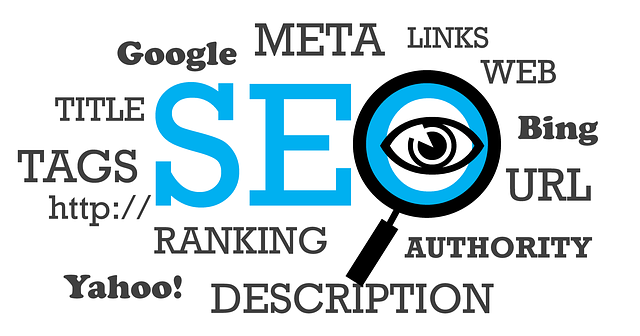Understanding keyword relevance is crucial for SEO. Research high-volume, low-competition keywords, optimize meta data, and naturally incorporate them into content. Enhance mobile usability and create valuable, contextually relevant information to boost rankings. Regularly update strategies based on algorithm changes. Optimize on-page elements like titles, headings, meta descriptions, and internal links. Build high-quality backlinks from authoritative sites to improve rankings and user experience. Conduct competitor analysis for industry trends and content gaps. Continuously monitor performance, track keywords, and analyze user behavior to maintain or improve rankings using SEO tips like optimizing meta tags and site speed.
In today’s digital landscape, understanding keyword optimization is crucial for any website aiming to rank higher. This comprehensive guide offers valuable SEO tips for ranking higher by delving into essential strategies like understanding keyword relevance, conducting thorough research, and optimizing on-page elements. We also explore the importance of building high-quality backlinks and analyzing competitors’ tactics, along with continuous monitoring and adjustments. Implement these steps to revolutionize your online visibility.
Understanding Keyword Relevance

Understanding Keyword relevance is a cornerstone of successful SEO strategies, aiming to match your content with users’ search intent. It involves delving into the specific terms and phrases that potential customers use when looking for products or services similar to yours. By aligning your keywords with these search queries, you ensure your website appears relevant in search engine results pages (SERPs).
Effective SEO Tips for Ranking Higher include keyword research to identify high-volume, low-competition keywords; optimizing title tags and meta descriptions; incorporating keywords naturally into your content; and ensuring a user-friendly experience on mobile devices. These strategies help search engines comprehend the context of your content, thereby increasing the chances of higher rankings and more organic traffic.
Conducting Comprehensive Research

Conducting comprehensive research is a cornerstone in the journey towards enhancing your search engine optimization (SEO) strategy and boosting rankings. It involves an in-depth analysis of both your target audience and existing competitors to gain valuable insights that can inform your keyword optimization efforts. Start by identifying relevant keywords and phrases that accurately reflect your niche or industry. Utilize SEO tips like analyzing Google Trends, exploring keyword research tools, and studying your competitors’ content to uncover high-value keywords with significant search volume but less competition.
This initial step is crucial as it helps you understand user intent, identify gaps in the market, and focus on long-tail keywords that can drive highly targeted traffic to your site. By combining these insights with regular monitoring of search engine algorithm updates, you’ll be well-positioned to refine your content strategy, improve website structure, and create a robust online presence that ranks higher over time.
Optimizing On-Page Elements

Optimizing on-page elements is a crucial step in enhancing your website’s visibility and ranking on search engines. When implementing SEO tips for ranking higher, focus on refining each page’s content and structure to create an engaging experience for users while ensuring search engine algorithms can easily interpret and index your site. Start by conducting thorough keyword research to identify relevant terms that target audience members use when searching for products or services related to your niche.
Incorporate these keywords naturally into your page titles, headings, meta descriptions, and content body. Remember, quality content is king; create well-structured paragraphs with compelling headings, make use of bullet points and numbered lists where appropriate, and include relevant multimedia like images and videos to boost engagement and reduce bounce rates. Additionally, ensure your website’s loading speed is optimal and that all internal links are functional and lead to valuable resources within your site.
Building High-Quality Backlinks

Building high-quality backlinks is one of the most effective SEO tips for ranking higher. These are incoming links from reputable and relevant websites that signal to search engines your content’s value and authority. Focus on acquiring backlinks from sites with high Domain Authority (DA) and a related topic to yours, as these carry more weight. Engaging in guest blogging, creating shareable infographics, or offering valuable resources can attract quality backlinks naturally.
Additionally, it’s crucial to diversify anchor text used for these links. Using varied keywords within context makes your site appear more natural to search engines. Avoid keyword stuffing and over-optimizing; instead, focus on quality content that naturally attracts relevant backlinks. This strategy not only boosts your rankings but also enhances user experience by driving them from authoritative sources to your website.
Analyzing Competitors' Strategies

Analyzing competitors’ strategies is a crucial step in formulating an effective SEO plan. By studying your rivals’ online presence and content, you can uncover valuable insights into what’s working in your industry and identify gaps where you can differentiate yourself. Look for keywords they’re targeting and understand their content creation tactics. This involves researching their website structure, the type of content they produce, and how frequently they update it.
Utilizing SEO tips for ranking higher, such as optimizing meta titles and descriptions, creating high-quality content that resonates with your audience, and ensuring a seamless user experience, can help you gain an edge over competitors. Additionally, keeping an eye on their backlink profiles and social media engagement can provide further guidance on building your own strategic framework to boost your online visibility and attract more organic traffic.
Continuous Monitoring and Adjustments

Continuous monitoring is an essential part of any successful SEO strategy, as search engine algorithms are constantly evolving. To keep up with these changes and maintain or improve rankings, regular checks are necessary. This involves analyzing website performance, tracking keyword positions, and understanding user behavior. By utilizing SEO tips for ranking higher, such as optimizing meta tags, improving site speed, and creating high-quality content, you can ensure your website remains competitive.
Adjustments based on data-driven insights are crucial. Regularly reviewing analytics reports allows marketers to identify areas of improvement. For instance, if a specific page is not performing well in terms of user engagement or bounce rates, adjustments like enhancing content relevance or optimizing for mobile users might be required. Staying agile and making timely changes can significantly impact search engine rankings positively.
